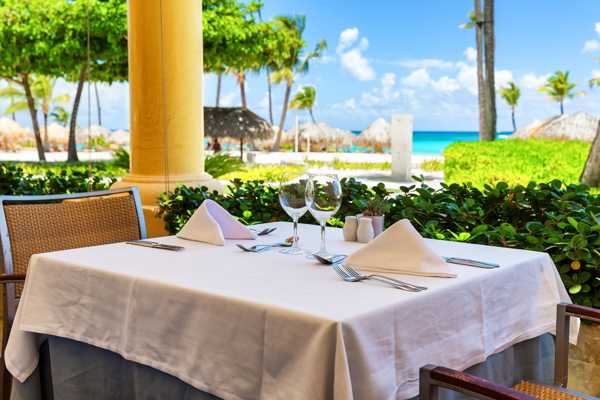The Dominican Republic is home to a delicious array of dishes that exemplify cuisine that's simultaneously Caribbean and positively Dominican. While the rich culinary traditions of the Dominican Republic are hard to narrow down to just 10 foods, there are some foods that tend to be more popular than the rest.
Immersing yourself in the local cuisine is the best way to experience what it's like to be a local, so make sure you take the time to dine like a Dominican during your visit. Take a look at the 10 best local Dominican foods to try.
- 1
Sancocho
Taste a local meat stew

- Matgæðinga
Sancocho is a popular beef stew that's considered one of the most iconic Dominican dishes containing root vegetables and meat combined to a rich, thick, and meaty consistency. Quite a few different versions are available, with some including just a singular meat and others having a combination.
If you travel throughout Latin America, you may see Sancocho in quite a few different places, but the stew is prepared differently depending on where you are. The Dominican version is its own unique entity that you can only taste in the Dominican Republic.
- 2
Mangú
Try a plantain mash

- Matgæðinga
Mangú is a dish you'll only find in the Dominican Republic that features mashed plantains served most often with eggs and fried salami with cheese. When it's served in conjunction with eggs, salami, and queso frito, it's referred to locally as Los Tres Golpes, which means The Three Strikes.
For the most part, you'll see this as a breakfast dish, but you'll find some restaurants that serve these mashed plantains for dinner as well. You'll find them most often served in small portions and even as little balls to eat in just 2 or 3 bites.
- 3
Habichuelas Guisadas
Check out local stewed beans

- Matgæðinga
Habichuelas Guisadas are stewed beans made using pinto, cranberry, or red kidney beans that are cooked with onion, pepper, oregano, and tomato sauce amongst other ingredients. They're a classic staple of the Dominican lunch alongside cooked rice.
You'll find these beans virtually everywhere across the country, and it's not uncommon for them to be included in at least one meal for the average Dominican every day. If you're looking to make some yourself using local ingredients, feel free to put your own twist on it. Pretty much every Dominican household does.
- 4
Pollo Guisado
Enjoy some braised chicken

- Matgæðinga
Pollo Guisado is a quick and easy chicken dish that utilises as much of the chicken as possible while pairing it with onion, garlic, oregano, and several other seasonings. This dish gained popularity and became a staple of Dominican cuisine thanks to its affordability.
To get the most out of their purchase, cooks adopted the use of every part of the chicken possible including the feet and giblets, though you're free to stick with breasts and thighs if you prefer. It's a cornerstone of the Dominican lunch meal, La Bandera Dominicana, so you'll find it virtually everywhere.
- 5
Bizcocho Dominicano
Indulge your sweet tooth

- Matgæðinga
Bizcocho Dominicano is a Dominican cake defined by its airy and buttery texture that's complemented by a traditional pineapple filling that takes a bit of finesse to get right. You'll find it used at just about any celebration you can imagine in the country.
This cake is a delicacy requiring expert skills and committed attention to detail to get it right. The chiffon style mixed with traditional pineapples offers a unique taste that just may ruin other desserts for you, so proceed with caution.
- 6
La Bandera
Experience the traditional Dominican lunch

- Matgæðinga
La Bandera Dominicana, or the Dominican Flag, is the traditional standard lunch with rice, beans, and meat, though the details can vary quite a bit. In many cases, this lunch is served with a salad as well as a dessert afterwards like candied pineapple.
Each part of this lunch is customisable, and the kind you get may vary depending on where you are in the country. The beans are typically pinto, red kidney, or cranberry, but you can find black or white beans, too. The meat is mostly chicken or beef, but you'll find fish and pork options also. The rice, however, is fairly standard.
mynd frá Richie Diesterheft (CC BY 2.0) breytt
- 7
Pescado Frito
Taste an iconic coastal dish

- Matgæðinga
Pescado Frito is a fried fish that's typically sea bass, snapper, or grouper seasoned in oregano and garlic then fried in oil with the entire fish being served as a whole. Feel free to go beyond the standard spices if you want to make some yourself, as every chef in the country typically does the same.
You can find this dish virtually everywhere in populated coastal towns, as it's a popular street food that basically requires just fresh fish. The rest of the ingredients are things most cooks and chefs have on hand.
- 8
Bacalao
Try one of the country's oldest dishes

- Matgæðinga
Bacalao, or codfish, is one of the oldest dishes in the country that consists of cod that's been boiled then cooked in a pan after being cut into small chunks. Bacalao is often seasoned with parsley, peppers, and tomatoes while served alongside starches like potatoes.
The history of this dish can be traced back to the Conquista, with it being particularly popular with Catholics during their Lenten tradition, and that eventually carried over to the modern Dominican Lenten tradition. The dish is so tasty, though, that it has long since spread outside the Catholic community.
- 9
Mondongo
Try a soup made with tripe

- Matgæðinga
Mondongo, or Sopa de Mondongo, is a soup made using diced tripe from beef that's been washed in lime or lemon along with some vegetables and potatoes. While this dish is popular throughout Latin America, the Dominican version is unique thanks to the use of Dominican oregano.
When you're looking to try this soup, you may also find a thicker version of it that uses tomato paste rather than fresh tomatoes and with extra ingredients like plantains and squash. Additionally, this alternative version uses cassava rather than potatoes.
- 10
Chivo
Enjoy a goat stew

- Matgæðinga
Chivo simply means goat, but it references a notable goat stew from the northwestern Dominican Republic that features cooked goat with orange, onion, oregano, and peppers. Goat is considered a delicacy throughout the Dominican Republic, so you'll find that it's more common than you may have expected.
One of the reasons Chivo is especially popular in the northwestern Dominican Republic is because the native goats there allegedly feed on wild oregano, giving them inherent seasoning. Given that oregano is used in virtually every version of this dish, that legend may not exactly carry much weight, but it's still a cultural staple.


















